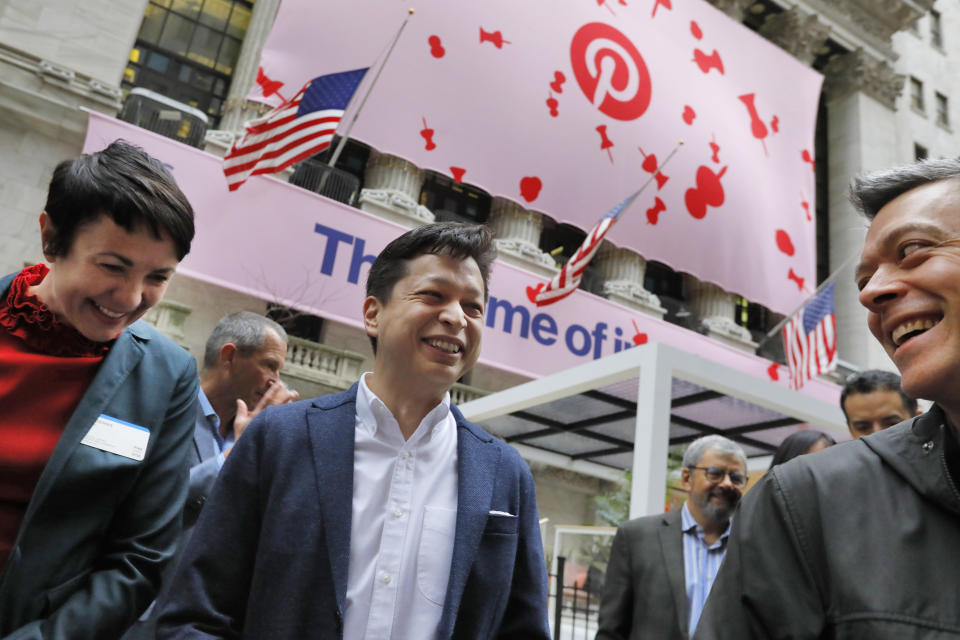Why Pinterest is immune from problems facing Facebook, YouTube, and Twitter
Pinterest (PINS) may have just IPOed in April, but it already has one advantage versus competition like Facebook (FB), Twitter (TWTR) and Alphabet’s (GOOG, GOOGL) YouTube, according to some analysts.
One of Pinterest’s strengths is its focus on aspirational content, like weddings, home decor, and clothing, Barclays analysts Ross Sandler, Deepak Mathivanan, and Ryan Gee wrote in a note published on Monday. That same focus has also worked somewhat in Pinterest’s favor, they argue, buffering the social network from some challenges that have plagued other platforms in more recent years.
‘A feel good product’
“We believe Pinterest is a ‘feel good’ product that won't get caught up in the issues that Facebook, YouTube, and Twitter are dealing with around privacy and other societal issues,” the Barclays analysts note.
Since Ben Silbermann, Evan Sharp, and Paul Sciarra founded Pinterest in 2009 as a way for users to search and bookmark items and ideas from the internet, the company has earned a loyal following. More than 265 million monthly users now “pin” items to virtual collections as a way to help visualize ideal scenarios like a meal, their wardrobe, home, or wedding.
Because Pinterest users focus more on lifestyle content than other areas such as general news, the platform has generally been less susceptible to issues faced by Facebook and Twitter, like fake news and trolls. However, the company has also taken some steps in more recent years to tackle the spread of anti-vaccination propaganda. It rolled out a virtual blacklist of search terms late last year so that searches for specific keywords yield no results.
Searching for “vaccine” on Pinterest, for instance, results only in a message stating the topic violates Pinterest’s community guidelines, which “prohibit harmful medical misinformation,” and a link to the Mayo Clinic. The company has said the blacklist is a temporary measure until it eventually rolls out better solutions.
A more successful IPO than other tech startups
The San Francisco-based company has seen its stock rise nearly 50% from its offering price since its IPO on April 18, marking a stark comparison with Uber’s and Lyft’s IPOs, which continue to trade lower than their respective offering prices.
Pinterest on Thursday is scheduled to report earnings for the first quarter of 2019. Wall Street is expecting Pinterest to report a loss of $.11 per share on revenues of $200.6 million. Thursday’s earnings will mark the nine-year-old company’s first-ever earnings as a publicly-traded entity.

Although Pinterest’s 265 million monthly active users falls well short of social media competitors such as Facebook’s 2.38 billion monthly users and even Twitter’s 330 million monthly active users, Pinterest’s revenue growth and narrowing losses have made it a compelling buy for some investors. Pinterest’s revenues grew 58% from 2016 to 2017 and 60% from 2017 to 2018. Meanwhile, Pinterest generated a net loss of $63 million in 2018 — down 105% from the year prior.
At least four Wall Street analysts initiated their coverage of Pinterest earlier this week with a “Neutral” rating, indicating a wait-and-see approach around stock performance in the coming months, as well as user and revenue growth.
The Barclays analysts offered five reasons to “like” Pinterest as a stock, including Pinterest’s steady 20%-plus year-over-year user growth — currently well above Facebook (FB), Twitter (TWTR) and Snap’s (SNAP) user growth — its compelling advertising business, its commerce-friendly audience, and accelerated revenue growth in 2018. However, they also noted possible headwinds, including the general tendency for companies with mobile advertising to see some choppiness on Wall Street for a while following that initial “IPO pop.” Facebook stock, for instance, popped on its first day of trading in May 2012 before sliding and eventually recovering.
Meanwhile, Credit Suisse research analysts Stephen Ju, Nicole D’Souza, Yoni Yadgaran and Philip Wang estimated in a note published on Monday that Pinterest’s average revenue per user, or ARPU, for U.S. users will grow from $9 per monthly active users in 2018 to around $26 in 10 years — a 188% increase. (Pinterest’s ARPU currently trails Twitter, with roughly $12 ARPU, Yelp at $12 ARPU, and is comparable to Snapchat’s $9 ARPU). In particular, they contend Pinterest’s international user base still has a significant amount of untapped revenue potential.
Follow Yahoo Finance on Twitter, Facebook, Instagram, Flipboard, SmartNews, LinkedIn,YouTube, and reddit.
More from JP:

